一级主要句型
日语一级句型

XXとXXが相俟って相辅相成抜けるような青空蔚蓝的天空雰囲気を明るくする使气氛活跃起来あいた口がふさがらない惊得目瞪口呆悪条件をものともせず不顾恶劣的条件朝が弱い不能起早チームの足を引っ張る拉全队的后腿彼にしては味なまねをした就他而言,算干得漂亮土を遊ばせておく使土地闲置起来頭にくる生气頭に入れる牢记頭が固い大脑僵化頭の働きが鈍い反应慢頭を下げる低头,佩服頭に残らない没印象,记不住伸びが頭打ちだ增长率到达顶点病状が思わしくない病情不容乐观頭から反対する坚决反对驚くにはあたらない不必吃惊人当たりがいい对人态度好一人当たり8000円每人8000元映画が当たりを取る电影获得成功交渉は鈴木君あたりが妥当だと思う像他这样的人更合适遠い親類に当たる人这个人是远亲この商品は当たるに違いない商品一定会畅销妹に当たる向妹妹出气そっけなく断れた无情的被拒绝了小松さんの迫力に圧倒されて、思わず同意してしまった被他的魄力所压倒,不由得同意了。
手を腰に当てる手扶着腰試験まで,後わずかとなった。
很快就要到考试了跡を絶たない类似事件不断努力の跡がうかがえる沁透着努力的作品穴を埋める填补亏空穴が開いていた开了一个洞抵抗して暴れる犯人负隅顽抗的犯人酒を飲んで暴れている耍酒疯スポットライトを浴びる受到公众的关注油を引く抹上一层油つい甘えてしまう不由得撒起妖来このセーターは目が粗い这件毛衣织得松どうかあしからず请原谅頼りにならない靠不住一目を置く逊色一筹泥棒と一緒だよ无异于偷窃リズムが一緒だ旋律相同雲を掴むような話不着边际的话そんなに威張るな别那么摆臭架子借金を依頼する求人借钱歌を歌って色を添えた唱歌增添情趣言わずもがなのことを言う说了不该说的话隠居生活を楽しんでいる享受退休后的生活…を印象付けようとする希望造成...的印象タレントにインタビューをする采访演员建築工事を請け合う承包建筑工程考えが受け入れにくい难以接受思相手紙を受け取る收信日本語の授業を受け持つ担仸日语课讲师成功の見込みが薄い成功的希望不大叔父さんの持ち込んだ儲け話は、どうもうそっぽいです叔叔提起的那个赚钱的事,总觉得水分很大.うなぎのぼりに増える直线上升裏目に出る事与愿违売れ行きがいい/さっぱり销路好/不好予想を上回る超出预想免許を交付する发给执照政府が苦しい立場に追い込まれた陷入窘境この計画の成功は大野さんの働きにおうところが大きい。
一级考级重点单词 句型 人名 动词
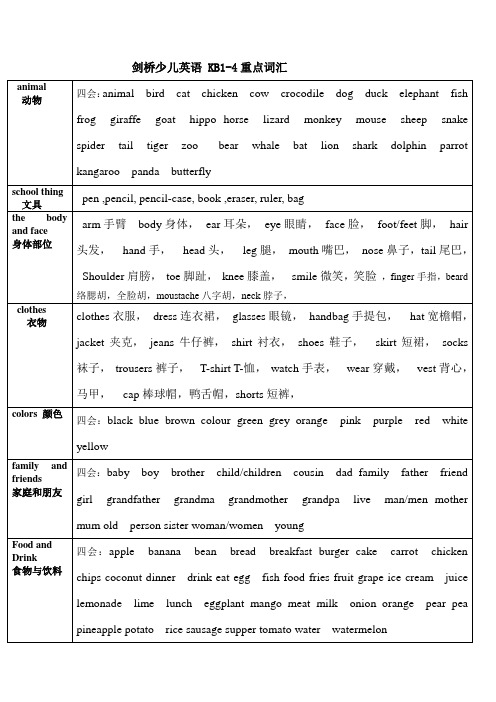
剑桥少儿英语 KB1-4重点词汇animal动物四会:animal bird cat chicken cow crocodile dog duck elephant fishfrog giraffe goat hippo horse lizard monkey mouse sheep snakespider tail tiger zoo bear whale bat lion shark dolphin parrotkangaroo panda butterflyschool thing文具pen ,pencil, pencil-case, book ,eraser, ruler, bagthe body and face身体部位arm手臂body身体,ear耳朵,eye眼睛,face脸,foot/feet脚,hair 头发,hand手,head头,leg腿,mouth嘴巴,nose鼻子,tail尾巴,Shoulder肩膀,toe脚趾,knee膝盖,smile微笑,笑脸,finger手指,beard 络腮胡,全脸胡,moustache八字胡,neck脖子,clothes衣物clothes衣服,dress连衣裙,glasses眼镜,handbag手提包,hat宽檐帽,jacket夹克,jeans牛仔裤,shirt衬衣,shoes鞋子,skirt短裙,socks袜子,trousers裤子,T-shirt T-恤,watch手表,wear穿戴,vest背心,马甲,cap棒球帽,鸭舌帽,shorts短裤,colors 颜色四会:black blue brown colour green grey orange pink purple red whiteyellowfamily and friends家庭和朋友四会:baby boy brother child/children cousin dad family father friend girl grandfather grandma grandmother grandpa live man/men mother mum old person sister woman/women youngFood and Drink食物与饮料四会:apple banana bean bread breakfast burger cake carrot chicken chips coconut dinner drink eat egg fish food fries fruit grape ice cream juice lemonade lime lunch eggplant mango meat milk onion orange pear pea pineapple potato rice sausage supper tomato water watermelonThe home家四会:apartment armchair bath bathroom bed bedroom bookcase box lamp camera chair clock computer cupboard desk dining room doll umbrella door flat flower garden hall house kitchen lamp living-room mat mirror painting phone picture radio room video sleep sofa table TV (television)toy tree wall watch windownumber数字1-20(会阿拉伯数字)places & directions 位置与方向四会:park near shop store street there here了解:under behind between in in front of next to onSchool 学校四会:board book bookcase class classroom close colour computer cupboard desk door draw English eraser floor lesson letter line listen to look number open pen pencil picture playground read right rubber ruler school sentence spell story teacher wall window word write了解:alphabet answer ask example find know learn page part question tell test tick understandSport & leisure运动与休闲四会:badminton ball baseball basketball beach bike boat book bounce camera catch doll draw drive enjoy favourite fish fly football game guitar hit hobby hockey jump kick kite listen to photo piano picture play with radio read ride run sing soccer song story sport table tennis TV tennis throw toy watch sporttime时间四会:clock watch了解:afternoon birthday day end evening morning night todaytoy玩具四会:ball baseball basketball bike car doll game volleyball table tennis monsterplane robot toytransport四会:bike boat bus car fly go helicopter lorry/truck motorbike交通工具plane ride run train考级常见英文名Alex Ann Ben Bill Jill Kim Lucy May Nick Pat Sam Sue Tom Tony Sally考级重要动词eat-eating draw-drawing jump-jumping put-putting wave-wavingwear-wearing fly-flying take-taking pick up drink-drinking watch-watching hit-hitting throw-throwing point-pointing stand-standing sleep-sleeping hold-holding spell show-showing sing-singingkick-kicking play-playing talk-talking swim-swimming drive-drivingpaint-painting run-running understand write-writing catch-catchinglook-looking close-closing listen-listening look-looking dance-dancing clean-cleaning find-finding walk-walking get-getting sit-sitting一级重点句型一、What 句型:问….是什么?1、What’s this?这是什么?It’s a jacket.它是一件夹克衫。
剑桥少儿英语一级(A册)单词词组句型
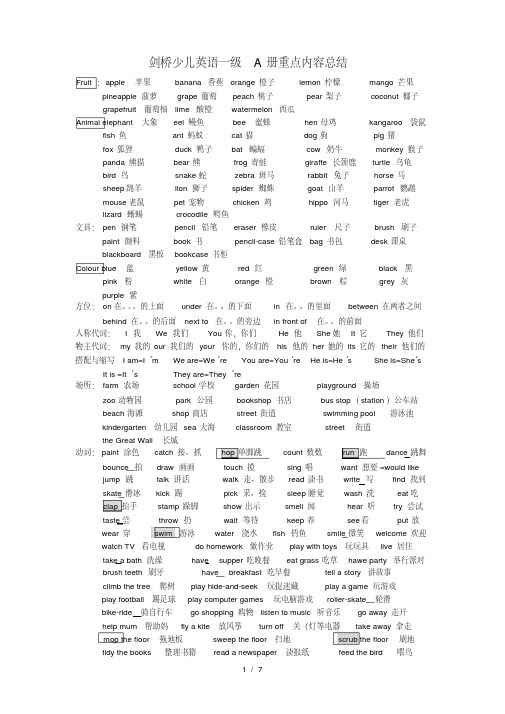
剑桥少儿英语一级A册重点内容总结Fruit:apple 苹果banana 香蕉orange橙子lemon柠檬mango芒果pineapple菠萝grape葡萄peach桃子pear梨子coconut椰子grapefruit葡萄柚lime 酸橙watermelon西瓜Animal elephant大象eel 鳗鱼bee 蜜蜂hen母鸡kangaroo 袋鼠fish鱼ant蚂蚁cat猫dog狗pig猪fox狐狸duck鸭子bat 蝙蝠cow 奶牛monkey猴子panda熊猫bear熊frog青蛙giraffe长颈鹿turtle乌龟bird鸟snake蛇zebra斑马rabbit兔子horse马sheep绵羊lion狮子spider蜘蛛goat 山羊parrot鹦鹉mouse老鼠pet宠物chicken鸡hippo河马tiger老虎lizard蜥蜴crocodile鳄鱼文具:pen 钢笔pencil 铅笔eraser 橡皮ruler 尺子brush 刷子paint颜料book书pencil-case铅笔盒bag书包desk课桌blackboard黑板bookcase书柜Colour blue 蓝yellow黄red 红green 绿black 黑pink 粉white 白orange 橙brown 棕grey 灰purple紫方位:on在。
的上面under在。
的下面in 在。
的里面between在两者之间behind在。
的后面next to 在。
的旁边in front of 在。
的前面人称代词:I 我We 我们You你,你们He 他She她It它They他们物主代词:my我的our我们的your 你的,你们的his 他的her她的its它的their他们的搭配与缩写I am=I’m We are=We’re You are=You’re He is=He’s She is=She’s It is =It’s They are=They’re场所:farm农场school学校garden花园playground操场zoo动物园park公园bookshop书店bus stop(station)公车站beach海滩shop商店street街道swimming pool 游泳池kindergarten幼儿园sea 大海classroom教室street 街道the Great Wall 长城动词:paint涂色catch接、抓hop单脚跳count数数run跑dance跳舞bounce 拍draw画画touch摸sing唱want想要=would like jump跳talk讲话walk走、散步read读书write写find找到skate滑冰kick踢pick采、捡sleep睡觉wash洗eat吃clap拍手stamp跺脚show出示smell闻hear听try尝试taste尝throw扔wait等待keep养see看put放wear穿swim 游泳water 浇水fish 钓鱼smile微笑welcome欢迎watch TV看电视do homework做作业play with toys玩玩具live居住take a bath洗澡have supper吃晚餐eat grass吃草hawe party举行派对brush teeth刷牙have breakfast吃早餐tell a story讲故事climb the tree 爬树play hide-and-seek 玩捉迷藏play a game玩游戏play football踢足球play computer games 玩电脑游戏roller-skate 轮滑bike-ride 骑自行车go shopping购物listen to music听音乐go away走开help mum 帮助妈fly a kite 放风筝turn off 关(灯等电器take away拿走mop the floor 拖地板sweep the floor 扫地scrub the floor 刷地tidy the books 整理书籍read a newspaper 读报纸feed the bird 喂鸟make tea 沏茶clean the cupboard清洁橱柜comb hair 梳头open打开guess riddles 猜谜语blow balloons 吹气球make words 拼单词close关mak a good shot 投一个好球hold a doll拿着洋娃娃drink juice喝果汁Food &Vegetable : ice cream冰激凌cake蛋糕juice果汁pizza披萨carrot萝卜pea豌豆onion洋葱bean青豆potato土豆sausage香肠tomato西红柿rice米饭bread面包egg鸡蛋honey蜂蜜pumpkin南瓜milk牛奶tea茶Clothes jacket夹克衫shorts短裤T-shirt T恤shirt长袖衬衣cap帽子shoes鞋子dress长裙skirt短裙jeans牛仔裤trousers长裤vest马甲handbag手提包hat帽子socks袜子glasses眼镜交通工具:car小汽车bus公共汽车bike自行车jeep吉普车train火车plane飞机ship轮船boat小船on foot步行truck\lorry卡车motorbike 摩托车helicopter直升飞机wheel轮子Body hair头发mouth嘴eye眼睛nose鼻子head头leg腿arm胳膊ear耳朵hand手foot脚tooth牙齿face脸neck脖子tail尾巴wing翅膀反义词big大的—small、little小的hot热的—cold冷的long长的—short短的happy高兴的—sad难过的quick快的—slow慢的young年轻的—old老的tall高的—short矮的left左边的—right右边的beautiful美丽的—ugly丑new新的—old 旧的easy容易的busy忙碌的nice好的、漂亮的单、复数fish---fish 鱼sheep—sheep绵羊people—people 人hair---hair头发mouse—mice老鼠foot---feet 脚tooth-teeth 牙齿child-children孩子man—men 男人woman—women女人peach-peaches 桃子mango—mangoes 芒果tomato—tomatoes 西红柿potato—potatoes土豆box—boxes 盒子fox—foxes 狐狸bus—buses公车this—these 这个that—those那个房间、物品::living room客厅kitchen厨房dining-room餐厅bedroom卧室bathroom卫生间house 房子window窗户door门flower花table桌子umbrella雨伞tree 树lamp台灯yo-yo溜溜球kite风筝TV电视fan电扇mirror镜子doll洋娃娃camera照相机watch手表clock钟表phone电话bell铃铛cup茶杯mat地垫photo照片present礼物aunt阿姨人物:mum/mother妈dad/father爸爸grandmother奶奶grandfather爷爷uncle叔brother兄弟sister姐妹cousin表兄妹nephew外甥niece侄女boy男孩girl女孩teacher老师queen皇后friend朋友pupil小学生man男人people人monster怪兽clown小丑Mr. 先生Miss 小姐Mrs. 女士Sir先生doctor 医生天地:the sun 太阳moon月亮star星星sky天空morning早上球类:football足球badminton羽毛球baseball棒球basketball篮球其他:X—ray X光beanbag沙包shuttlecock毽子hopscotch 跳格子name名字wheel轮子favourite最喜爱的family tree家谱hobby爱好paper纸人名: Amy Cathy Pat Sue Kim Sally May Ann Mary Lucy Bill Tom Nick Sam Frank Ted Ben Peter David Paul Steven 数字:Maths 数学plus加minus减特殊疑问词:what什么who 谁where在哪儿which 哪一个how 怎样how many多少问候:Hello! 你好!Hi!你好!Happy new year! 新年好!Glad to meet you ! 很高兴见到你。
一年级英语下册知识点总结

一年级英语下册知识点总结一年级英语下册主要涉及基本的英语词汇、句型、语法、听力和阅读技巧等方面的知识点。
以下是一年级英语下册的主要知识点总结:一、词汇:1. 形容词:如big、small、nice、happy等。
2. 名词:如book、pen、desk、chair等。
3. 动词:如eat、drink、run、jump等。
4. 数词:如one、two、three、four等。
5. 介词:如in、on、under等。
6. 代词:如I、you、he、she等。
7. 颜色词:如red、blue、green、yellow等。
8. 学习用品:如book、pen、pencil、dictionary等。
二、句型与语法:1. 简单的询问句:如What’s your name? How old are you?2. 简单的回答句:如My name is Mary. I am six years old.3. 简单的肯定句和否定句:如I like apples. I don’t like bananas.4. 一般现在时的使用:如He likes to play foo tball. She doesn’t like to swim.5. 可数名词和不可数名词的区别:如I have an apple. I don’t have any water.三、听力技巧:1. 听懂简单的英语单词和短语:如颜色、数字、学习用品等。
2. 听懂简单的句子和问题:如询问名字、年龄、喜欢的食物等。
3. 听懂简单的指令和指示词:如sit down、stand up、comehere等。
四、阅读技巧:1. 通过字母图表和图片学习英文字母的发音。
2. 认读简单的单词和短语:如颜色、数字、学习用品等。
3. 通过描述图片和阅读简单的故事理解句子的含义。
4. 理解简单的问题并回答问题。
五、常用句子和短语:1. What’s your name? My name is...2. How old are you? I am...3. What color is it? It is...4. What do you like? I like...5. Do you have...? Yes, I do. / No, I don’t.六、常用口语表达:1. Hello! / Hi!2. Goodbye! / Bye!3. Thank you! / You’re welcome!4. Excuse me! / Sorry!以上就是一年级英语下册的知识点总结,这些知识点涵盖了基本的英语词汇、句型、语法、听力和阅读等方面的内容。
全国英语等级考试一级写作中常见的十二种句型
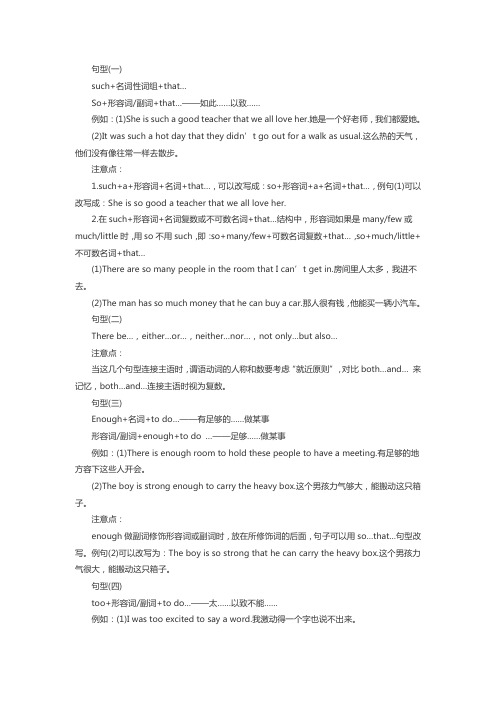
句型(一)such+名词性词组+that…So+形容词/副词+that…——如此……以致……例如:(1)She is such a good teacher that we all love her.她是一个好老师,我们都爱她。
(2)It was such a hot day that they didn’t go out for a walk as usual.这么热的天气,他们没有像往常一样去散步。
注意点:1.such+a+形容词+名词+that…,可以改写成:so+形容词+a+名词+that…,例句(1)可以改写成:She is so good a teacher that we all love her.2.在such+形容词+名词复数或不可数名词+that…结构中,形容词如果是many/few或much/little时,用so不用such,即:so+many/few+可数名词复数+that…,so+much/little+不可数名词+that…(1)There are so many people in the room that I can’t get in.房间里人太多,我进不去。
(2)The man has so much money that he can buy a car.那人很有钱,他能买一辆小汽车。
句型(二)There be…,either…or…,neither…nor…,not only…but also…注意点:当这几个句型连接主语时,谓语动词的人称和数要考虑“就近原则”,对比both…and…来记忆,both…and…连接主语时视为复数。
句型(三)Enough+名词+to do…——有足够的……做某事形容词/副词+enough+to do …——足够……做某事例如:(1)There is enough room to hold these people to have a meeting.有足够的地方容下这些人开会。
剑桥少儿英语的一级英语语法
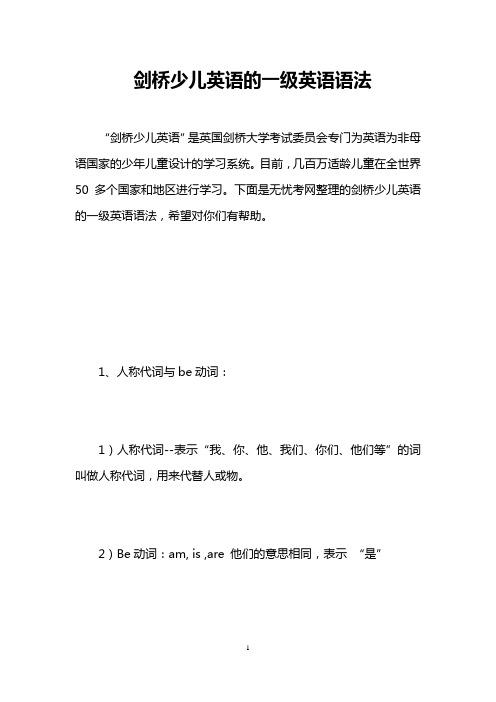
剑桥少儿英语的一级英语语法“剑桥少儿英语”是英国剑桥大学考试委员会专门为英语为非母语国家的少年儿童设计的学习系统。
目前,几百万适龄儿童在全世界50多个国家和地区进行学习。
下面是无忧考网整理的剑桥少儿英语的一级英语语法,希望对你们有帮助。
1、人称代词与be动词:1)人称代词--表示“我、你、他、我们、你们、他们等”的词叫做人称代词,用来代替人或物。
2)Be动词:am, is ,are 他们的意思相同,表示“是”3)人称代词与be动词的搭配:I---am, he----is, we---areshe---is they---areit ----- is you---are另外,is还用于一个人或者一个事物的后面,如Jim是6岁。
这时,Jim是一个人,Jim后面的是字就要用单词is来表示。
this,that 的后面也要用is .are用在多个人或物的后面,如Tom和Ann是五岁。
这时,Tom和Ann是两个人,后面的是字就要用单词are来表示。
am只用在我(I)的后面。
4)人称代词和be动词的缩写:I'm, he's, she's, it's, we're, they're, you're2、指示代词:表示这个那个,这些那些的词叫做指示代词。
指示代词有:这个this,那个that,这些these,那些those指示代词与be动词的搭配:this--is;that--is ;these--are;those-- are。
3、名词及名词的复数1)一般情况加–s,清辅音后读/s/ 浊辅音和元音后读/z/:girl-girls pen-pens bag-bags car-cars2)以s, sh, ch, x结尾加–es, 读/iz/ bus-buses watch-watches box-boxes brush-brushes3)结尾,变y 为i再加es, 读/z/ baby---babies但元音字母+y 结尾的名词变复数时,直接加s变复数。
剑桥少儿英语一级重点单词句型

剑桥少儿英语一级重点单词句型剑桥少儿英语一级是儿童学习英语的基础阶段,掌握重点单词和句型对于孩子们的英语学习至关重要。
下面将为您介绍一些剑桥少儿英语一级的重点单词和句型。
一、重点单词1. Apple - 苹果Example sentence: I like eating apples.(我喜欢吃苹果。
)2. Banana - 香蕉Example sentence: My sister likes eating bananas.(我妹妹喜欢吃香蕉。
)3. Cat - 猫Example sentence: The cat is sleeping.(猫在睡觉。
)4. Dog - 狗Example sentence: His dog is very playful.(他的狗很调皮。
)5. Elephant - 大象Example sentence: The elephant is big and strong.(大象很大很强壮。
)6. Fish - 鱼Example sentence: I can see fish swimming in the sea.(我能看到鱼儿在大海中游来游去。
)7. Giraffe - 长颈鹿Example sentence: The giraffe has a long neck.(长颈鹿有长长的脖子。
)8. Hat - 帽子Example sentence: I wear a hat to protect myself from the sun.(我戴帽子来保护自己免受太阳的照射。
)9. Ice cream - 冰淇淋Example sentence: I like chocolate ice cream.(我喜欢巧克力冰淇淋。
)10. Juice - 果汁Example sentence: Would you like some orange juice?(你要喝点橙汁吗?)二、重点句型1. What is your name? - 你叫什么名字?Answer: My name is Lily.(我的名字是莉莉。
英语一级笔试的知识点归纳
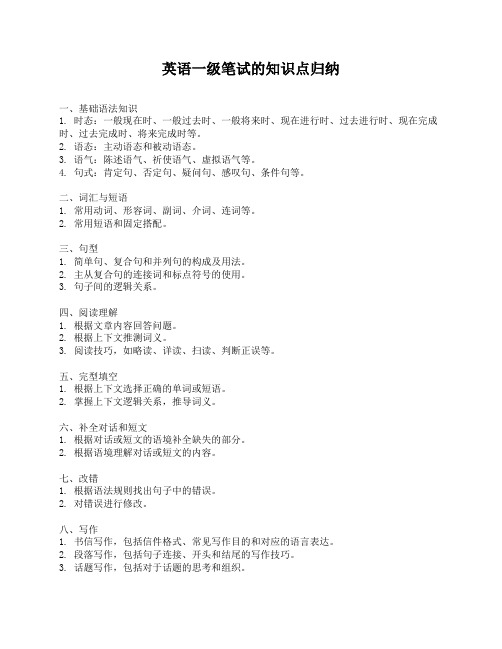
英语一级笔试的知识点归纳一、基础语法知识1. 时态:一般现在时、一般过去时、一般将来时、现在进行时、过去进行时、现在完成时、过去完成时、将来完成时等。
2. 语态:主动语态和被动语态。
3. 语气:陈述语气、祈使语气、虚拟语气等。
4. 句式:肯定句、否定句、疑问句、感叹句、条件句等。
二、词汇与短语1. 常用动词、形容词、副词、介词、连词等。
2. 常用短语和固定搭配。
三、句型1. 简单句、复合句和并列句的构成及用法。
2. 主从复合句的连接词和标点符号的使用。
3. 句子间的逻辑关系。
四、阅读理解1. 根据文章内容回答问题。
2. 根据上下文推测词义。
3. 阅读技巧,如略读、详读、扫读、判断正误等。
五、完型填空1. 根据上下文选择正确的单词或短语。
2. 掌握上下文逻辑关系,推导词义。
六、补全对话和短文1. 根据对话或短文的语境补全缺失的部分。
2. 根据语境理解对话或短文的内容。
七、改错1. 根据语法规则找出句子中的错误。
2. 对错误进行修改。
八、写作1. 书信写作,包括信件格式、常见写作目的和对应的语言表达。
2. 段落写作,包括句子连接、开头和结尾的写作技巧。
3. 话题写作,包括对于话题的思考和组织。
九、听力理解1. 听力材料的类型,包括对话、独白等。
2. 根据听力材料回答问题、选择正确答案等。
3. 掌握听力技巧,如辨认重点信息、注意听力材料的主旨等。
以上是一级英语笔试的主要知识点归纳,希望对你有所帮助。
剑桥少儿英语一级重点句型九天轻松复习

剑桥少儿英语一级重点句型九天轻松复习第一天:问候与自我介绍在学习英语时,我们经常需要向他人问好或自我介绍。
下面是一些常用的问候和自我介绍的句型:1. 问候语- Hello!(你好!)- Hi!(嗨!)- Good morning/afternoon/evening!(早上/下午/晚上好!)- How are you?(你好吗?)- How's it going?(最近怎么样?)- What's up?(有什么新鲜事吗?)2. 自我介绍- My name is [name].(我的名字是[name]。
)- I'm [name].(我是[name]。
)- Nice to meet you!(很高兴认识你!)- Pleased to meet you!(很高兴见到你!)- This is [name].(这是[name]。
)第二天:询问与回答关于人物的问题在英语的交流中,我们常常会询问和回答关于人物的问题。
以下是一些常用的句型:1. 询问人物信息- Who is he/she?(他/她是谁?)- What's his/her name?(他/她叫什么名字?)- How old is he/she?(他/她多大了?)- Where is he/she from?(他/她来自哪里?)- What does he/she do?(他/她是做什么的?)2. 回答人物信息- He/She is [name].(他/她叫[name]。
)- He/She is [age] years old.(他/她 [age] 岁。
)- He/She is from [place].(他/她来自[地方]。
)- He/She is a [occupation].(他/她是一个[职业]。
)第三天:询问与回答关于家庭的问题当我们想要了解一个人的家庭情况时,可以使用以下句型:1. 询问家庭信息- Do you have any brothers or sisters?(你有兄弟姐妹吗?)- How many people are there in your family?(你家有几口人?)- What's your father's/mother's name?(你爸爸/妈妈叫什么名字?)- How old are your brothers/sisters?(你兄弟/姐妹多大了?)2. 回答家庭信息- Yes, I have [number] brothers/sisters.(是的,我有[number]个兄弟/姐妹。
日语一级语法汇总学习
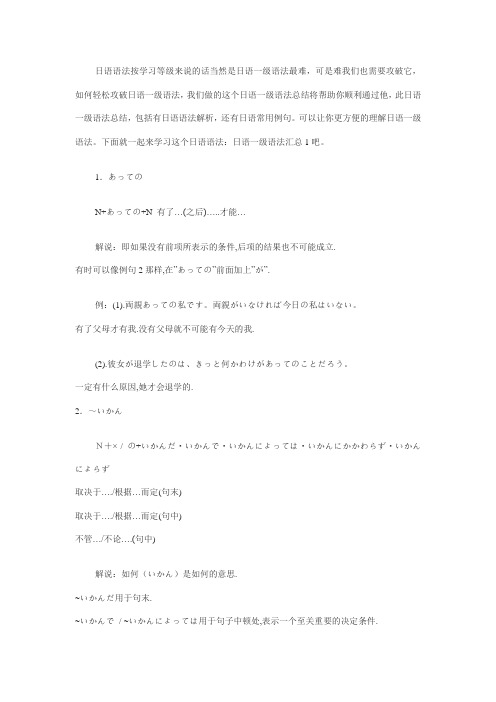
日语语法按学习等级来说的话当然是日语一级语法最难,可是难我们也需要攻破它,如何轻松攻破日语一级语法,我们做的这个日语一级语法总结将帮助你顺利通过他,此日语一级语法总结,包括有日语语法解析,还有日语常用例句。
可以让你更方便的理解日语一级语法。
下面就一起来学习这个日语语法:日语一级语法汇总1吧。
1.あってのN+あっての+N 有了…(之后)…..才能…解说:即如果没有前项所表示的条件,后项的结果也不可能成立.有时可以像例句2那样,在”あっての”前面加上”が”.例:(1).両親あっての私です。
両親がいなければ今日の私はいない。
有了父母才有我.没有父母就不可能有今天的我.(2).彼女が退学したのは、きっと何かわけがあってのことだろう。
一定有什么原因,她才会退学的.2.~いかんN+×/ の+いかんだ・いかんで・いかんによっては・いかんにかかわらず・いかんによらず取决于…./根据…而定(句末)取决于…./根据…而定(句中)不管…/不论….(句中)解说:如何(いかん)是如何的意思.~いかんだ用于句末.~いかんで/ ~いかんによっては用于句子中顿处,表示一个至关重要的决定条件.~いかんにかかわらず・いかんによらず用于句子中顿处、表示前项的条件再怎样变化,后项也不会受其影响的.※: ~いかんだ可以转变为“いかんにかかっている”或“いかんにきまっている”.的形态.例:(1).実験の結果いかんによっては研究を中止する可能性もある。
根据实验的结果,也有可能中止研究.(2).対応のいかんによらず、こちらは自分のやり方でやっていく。
不论对方如何反应,我们都要按自己的方法做下去.3.う(よう)が(と)动词意志形+う(よう)が(と)N・形动+であろう+が(と)・だろう+が(と)イ形容词--い→かろう+が(と)无论….都…./不管...解说:表示逆接,意为假设出现前项这种情况,也不会影响到后项.且前项一般带有疑问词来突出强调的语气,后项是表示强烈的主观意志(包括强调解释说明,主张,决心,推量,劝诱等.)~ても逆接表达的方式,其前项是既定条件,后项是客观事实,一般就不能用”う(よう)が(とも)”来替换.例:(1)どんな金持ちであろうが、幸福は金で買えるものではない。
一级考英语必考知识点(一)
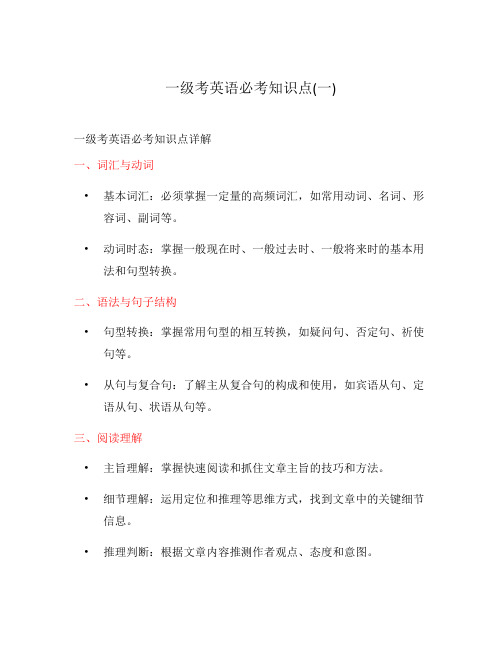
一级考英语必考知识点(一)
一级考英语必考知识点详解
一、词汇与动词
•基本词汇:必须掌握一定量的高频词汇,如常用动词、名词、形容词、副词等。
•动词时态:掌握一般现在时、一般过去时、一般将来时的基本用法和句型转换。
二、语法与句子结构
•句型转换:掌握常用句型的相互转换,如疑问句、否定句、祈使句等。
•从句与复合句:了解主从复合句的构成和使用,如宾语从句、定语从句、状语从句等。
三、阅读理解
•主旨理解:掌握快速阅读和抓住文章主旨的技巧和方法。
•细节理解:运用定位和推理等思维方式,找到文章中的关键细节信息。
•推理判断:根据文章内容推测作者观点、态度和意图。
四、写作与翻译
•书面表达:掌握写作基本结构、连贯使用句子和段落间的过渡等写作技巧。
•句子翻译:通过理解句子结构和使用正确词汇,准确翻译给定的句子。
•短文翻译:理解并准确表达给定的英文短文。
五、听力与口语
•基本对话:理解日常生活中的简单对话,包括问候、购物、问路等常用场景。
•改写口语:将书面语改写为口语表达,并注意语法与句子结构的变化。
以上就是一级考英语必考的相关知识点及其详解。
通过掌握这些知识点,相信你能够在考试中取得好成绩!。
先后造句一年级
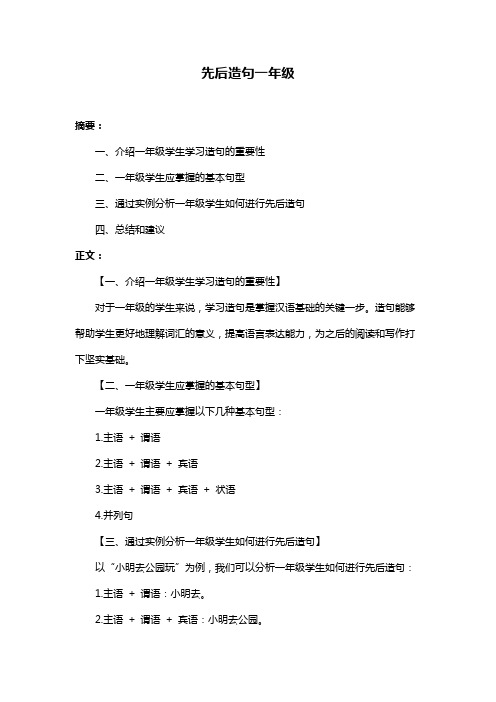
先后造句一年级
摘要:
一、介绍一年级学生学习造句的重要性
二、一年级学生应掌握的基本句型
三、通过实例分析一年级学生如何进行先后造句
四、总结和建议
正文:
【一、介绍一年级学生学习造句的重要性】
对于一年级的学生来说,学习造句是掌握汉语基础的关键一步。
造句能够帮助学生更好地理解词汇的意义,提高语言表达能力,为之后的阅读和写作打下坚实基础。
【二、一年级学生应掌握的基本句型】
一年级学生主要应掌握以下几种基本句型:
1.主语+ 谓语
2.主语+ 谓语+ 宾语
3.主语+ 谓语+ 宾语+ 状语
4.并列句
【三、通过实例分析一年级学生如何进行先后造句】
以“小明去公园玩”为例,我们可以分析一年级学生如何进行先后造句:
1.主语+ 谓语:小明去。
2.主语+ 谓语+ 宾语:小明去公园。
3.主语+ 谓语+ 宾语+ 状语:小明昨天去公园。
4.并列句:小明和小华一起去公园。
【四、总结和建议】
一年级学生通过掌握基本的句型,能够更好地进行语言表达。
在教学过程中,教师应注意引导和鼓励学生多进行练习,培养他们独立造句的能力。
公共英语一级考试词组句型
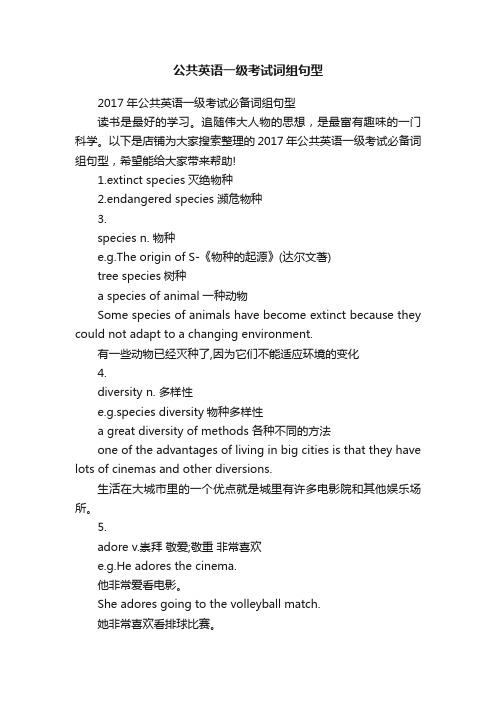
公共英语一级考试词组句型2017年公共英语一级考试必备词组句型读书是最好的学习。
追随伟大人物的思想,是最富有趣味的一门科学。
以下是店铺为大家搜索整理的2017年公共英语一级考试必备词组句型,希望能给大家带来帮助!1.extinct species灭绝物种2.endangered species 濒危物种3.species n. 物种e.g.The origin of S-《物种的起源》(达尔文著)tree species树种a species of animal 一种动物Some species of animals have become extinct because they could not adapt to a changing environment.有一些动物已经灭种了,因为它们不能适应环境的变化4.diversity n. 多样性e.g.species diversity物种多样性a great diversity of methods 各种不同的方法one of the advantages of living in big cities is that they have lots of cinemas and other diversions.生活在大城市里的一个优点就是城里有许多电影院和其他娱乐场所。
5.adore v.崇拜敬爱;敬重非常喜欢e.g.He adores the cinema.他非常爱看电影。
She adores going to the volleyball match.她非常喜欢看排球比赛。
6.clash n&v .冲突, 撞击声, 抵触e.g.clash of interests 利益冲突a clash with the police 与警察的`冲突I failed to go to her wedding because it clashed with my examination.我没能去参加她的婚礼,因为和我的考试日期冲突了7.mandate v&n. 将(某地)委托统治; 托管; 批准, 颁布e.g.mandate a policy批准一项政策The president had a clear mandate to end the war.总统得到明确的授权结束那场战争。
公共英语一级写作常见的六十二种句型

句型1:There+be +主语+地点状语/时间状语句型2:What's wrong with+sb./sth.?句型3:How do you like...?句型4:What do you like about...?句型5:had better(not)+动词原形句型6:How+adj./adv.+主语+谓语!What a/an+adj.+n.+主语+谓语!How cold it is today !今天多冷啊!What a fine picture it is!多美的一幅图画呀!句型7:Thank+sb.+for(doing)sth.句型8:So+be/情态动词/助动词+主语He is a student.So am I.他是一个学生,我也是。
句型9:...not...until...句型10:比较级+and+比较级句型11:the +比较级,the +比较级句型12:...as+adj./adv.+as.....not as(so)+adj./adv.+as..句型13:more/less+adj.+than...句型14:stop...from doing sth.句型15:both...and...句型16:either...or...句型17:neither...nor...句型18:...as soon as...句型19:...so+adj./adv.+that...句型21:be going to句型22:be different from句型23:Welcome(back)to...句型24:have fun doing句型25:...because.../...,so...句型26:Why don't you...?/Why not...?句型27:make itLet's make it half past nine.让我们定在九点半吧!句型28:have nothing to doThey have nothing to do every day.他们每天无所事事。
- 1、下载文档前请自行甄别文档内容的完整性,平台不提供额外的编辑、内容补充、找答案等附加服务。
- 2、"仅部分预览"的文档,不可在线预览部分如存在完整性等问题,可反馈申请退款(可完整预览的文档不适用该条件!)。
- 3、如文档侵犯您的权益,请联系客服反馈,我们会尽快为您处理(人工客服工作时间:9:00-18:30)。
startersA1.What’s your Chinese name?My name is Zhou Chenyang.2. What’s your English name?My English name is Amy / Ben3. How old are you? I’m 11 /12.4. Are you ten years old? No, I’m not.5. What’s your friend’s name?My friend’s name i s6. How old is she/he? She / He is 11.7. Have you got any brothers? Yes, I have./ No, I haven’t.8. What’s his name?His name is9. Have you got a sister? Yes, I have./ No, I haven’t.10. What’s her name?Her name is11. What’s this?(夹克衫) It’s a jacket.12. What’s that?(西瓜) It’s a watermelon.13. What are they?(裤子) They are trousers.14. Which is the pencil? It’s a pencil.15. Which is your cap, black one or blue one? The blue one.16. Is this your new bookcase? Yes, it i s. No, it isn’t.17. Is that Lily’s computer?(No, it isn’t.)18. What colour do you like? I like pink.19. Do you like gray? Yes, I do. / No, I don’t.20. Which colour do you like best最?Purple21. What’s your mother’s favorite colour?She likes red.Is pink your favorite colour? Yes, it is. / No, it isn’t.22.How many erasers are there in your pencil-box? 323. How many lamps are there in your bedroom? 124. How many feet have you got? 225. How many footballs do you want? 226. How many lions can you see in the zoo?(2)27. Have you got a radio? Yes, I have. / No, I haven’t.28. Have they got any fish? Yes, they have. / No, they haven’t.29. Has your mother got long hair? Yes, she has. / No, she hasn’t.30. Has your English teacher got blue eyes? No, he / she hasn’t.31. What hair has your Maths teacher got? Black hair. / Short hair.32. Has WangWenjing got big eyes? Yes, she has. No, she hasn’t.33. How many people are there in your family? 334. Who’s your fat her? Next to Mike.35. Is he tall or short? He is tall / short.36. Who’s beautiful in your family?My mom / sister.37. Who’s old in your family?My grandpa.38. Who’s the little girl?(She is Pat)39. What’s your favorite drink?I like milk / Coke.40. What’s your favorite food?I like fish.41. What fruit do you like best? I like bananas.42. Do you want a new bike? Yes, I do.43. What do you want on your birthday? A story-book.44. Do you want an ice-cream or a coconut? I want an ice-cream / a coconut.45. Which is your ruler, blue one or yellow one? The yellow one.46. Can you draw your teacher? Yes, I can.47. What nose have you got? Small nose./ Big nose.48. What’s for lunch?I have some fish, rice and soup.49. What have you got for supper? I have got beef ,fish and meat.50. Where do you want to go? Shanghai.51. How do you go there? By plane / train / bus52. Do you come to school by bus? Yes, I do. / No, I don’t.53. Do you walk to school ever y day? Yes, I do./No,I don’t.54. Do you often go to bookstore? Yes, I do./No,I don’t.55. How do you do? How do you do?56. Have you got any friends in your class? Yes,I have.57. What do mice(老鼠)like to eat? Rice.58. What does your mother like to eat? She likes to eat rice/…59. What do you do on Tuesday? I read a book and play games.60. What colour is LiMing`s jacket? It’s brown.61. How many crayons are there in your schoolbag? Twelve.62. Is it a big lemon or a small bean? A small bean.startersB1. Are there any horses on the farm? Yes, there are. / No, there aren’t.2. Are these dogs dirty? Yes, they are. / No, they aren’t.3. Do you like animals? Yes, I do./No,I don’t.4. What’s your favorite animal?I like dogs.5. What are you doing now? I am eating./writing…6. What’s your father doing now?He’s driving a car.He’s working./ sleeping.7. What are they doing?(放风筝) They are flying a kitel.8. What is Peter doing?(刷房子) He’s brushing the house.9. Is the little dog sleeping? Yes, it is. / No, it isn’t.10. What is the little dog doing?(抓蝴蝶) It is catching butterflies.11. Can I have some bread? Sure. Here you are.12. Where is the cat?(床下)? It’s under the bed.13. What is it doing?(吃鱼) It’s eating fish.14. Where is TV? It’s on the desk./ near the wall15. What can you do in your living room? I can watch TV.16. Do you have meals in your bedroom? Yes, I do ./No,I don’t.17. What’s in your bedroom? A bed, a TV, a desk and a computer.18. Is your bedroom big or small? It’s big. /small.19. What do you do at school? Read a book, play games20. What do you do at home? Watch TV, eat dinner and …21. What do you do in a park? Run, walk, smell the flowers.22. What do you do at the Weekend周末? Play computer games.23. What do you do after class? Do homework.24. What do you do in the morning? Eat breakfast.25. What do you do at noon? Eat lunch.26. What do you do in the evening? I often watch TV.27. What do you do every day? I often learn English.28. What do you do at your birthday party? Eat the birthday cake.29. What do you do on the playground in the afternoon? I play football./flya kite…30. Do you like swimming? Yes, I do. / No, I don’t.31. What’s your favorite sport?I like running32. What’s his sister’s favorite sport?She likes …33. What are they playing?(羽毛球) They are playing badminton.34. What can you see in a beautiful garden? I can see some flowers.35. How many boys and girls in your class? 20 boys and 23 girls.36. Can you fly like a bird? Yes, I can. / No, I can’t.37. Can you walk like a tortoise? Yes, I can. / No, I can’t.38. Can your grandmother read books? Yes, she can. / No, she can’t.39. Can your little brother swim? Yes, he can. / No, he can’t.40. Can your mother make a hat? Yes,she can.41. Can you play the piano? Yes, I can.42. What does your mother like doing? She likes watching TV.43. What does your best friend like doing? He/She likes playing computer games.44. What does your teacher do every morning? He/She drinks milk.45. Does your mother go to work every day? Yes, she does. / No, she doesn’t.46. Whose birthday is it today? (It’s Sam’s birthday.)47. Is it your birthday today? No, it isn’t.48. What’s your hobby?I like watching TV.49. What’s your mother’s hobby?She likes watching TV.50. What`s the little duck’s hobby? It likes swimming.51. What do you like to do after school? I like to do homework.52. Are you wearing glasses? Yes, I am./ No, I’m not.53. Who is the tallest最高的 in your family? My father.54. Who is the youngest in your family? Me.55. Who is the oldest in your family? My grandpa.56.Do you have a rabbit at home? Yes, I do. / No, I don’t.57. What are you wearing now? I’m wearing a T-shirt58. How often do you go to the zoo? Once a week ./Twice a week.59. Who do you go to the park with? My parents.60. What do you like to play in the park? I like to row a boat./ fly a kite.61. Is the park beautiful? Yes, it is.62.When do you eat ice-cream? In summer.63. Do you have a pet at your home? Yes, I do.64.What does your father do? He is a driver / farmer 65. What do you want for a pet? I want a panda/ dog / dragon 66.What sport can you play? I can play badminton.号。
